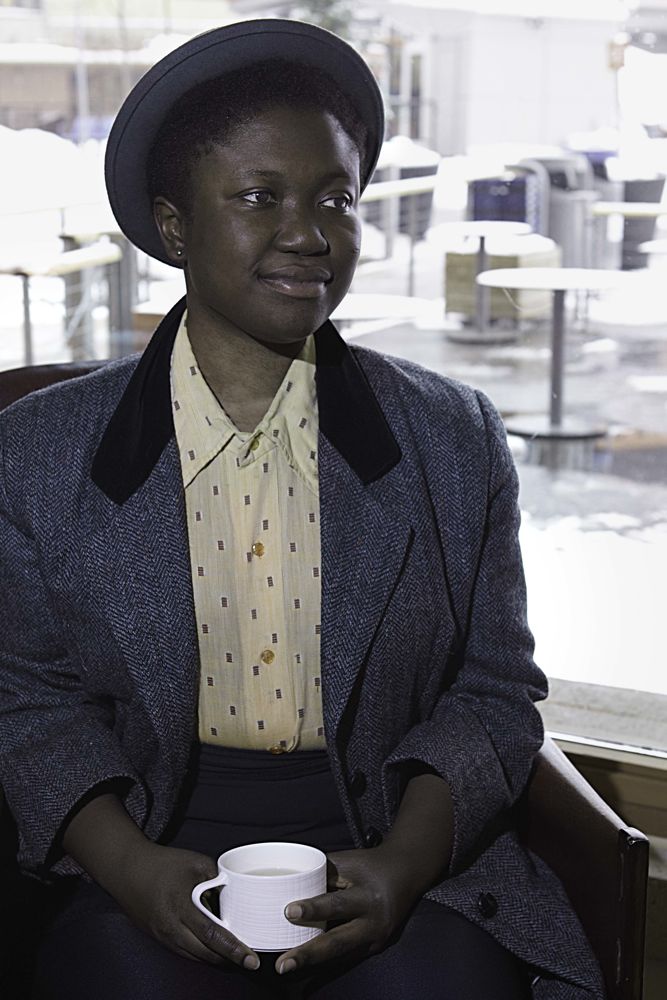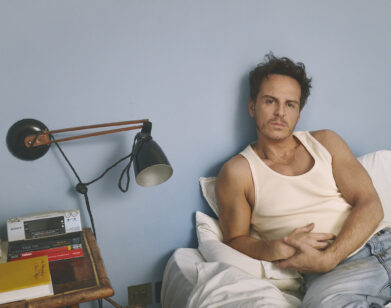Discovery: Frances Bodomo

ABOVE: FRANCES BODOMO AT THE FARM RESTAURANT AT CANYONS RESORT IN PARK CITY, UTAH. PHOTO BY KATIE FISCHER.
“Boneshaker‘s definitely the first movie that I’m really, really proud of, so of course I was going to submit it to everything and anything,” laughs filmmaker Frances Bodomo. Among the “everything and anything” was the Sundance Film Festival in Park City, Utah, where Boneshaker premiered last week—a pretty impressive entrée into the professional film world.
Based on personal experience, Boneshaker tells the story of Blessing, a young African girl in America played by Beasts of the Southern Wild break-out star, Quvenzhané Wallis. The film begins with Blessing throwing a tantrum; unlike her sister, played by Playshena Rose Thomas, Blessing is not well-behaved, and her Ghanaian grandmother is convinced that she is possessed by an evil spirit. With the two daughters reluctanctly in tow, Blessing’s family travels through Louisiana to a church by the river, Fire Power Ministries, run by “God’s Warrior Princess” Dr. Stella Gwandiku, to save their child.
We recently spoke with Bodomo, who is still a graduate student at NYU film school, about her first-ever film festival, working with children, and how it feels to be exorcised.
AGE: 24
HOMETOWN: I was born in Ghana, but I grew up in Norway, California, and Hong Kong.
FAVORITE FILMMAKERS: John Cassavetes, Werner Herzog, Harmony Korine. These are people who make very rough movies that kind of feel human. They make a lot of movies about outsiders, without being pity parties—without being patronizing.
FIRST TIME AT SUNDANCE: There’s a lot of events for filmmakers, it’s about going to places and quote-unquote networking, which I’m not the best at, but I’m learning. [laughs] And of course, seeing a lot of movies. There are so many movies playing that I’m so excited to be able to see before they come out. There’s a movie by Matt Porterfield, who did Putty Hill, called I Used to Be Darker, and then one of my fellow NYU people has a movie there called Newlyweeds, it’s by Shaka King.
CASTING THE YOUNGEST EVER OSCAR-NOMINATED ACTRESS: I wanted to make a movie about an African family going to a church to exorcise their daughter, which is a common practice in Ghana. I wasn’t going to be able to get the money to fly people out to Ghana to shoot this movie, so the story changed to an African-American family, or rather, an African family in America. I was looking for a landscape that sort of reminded me of Africa that was kind of lush, and heavy, and sunny, and drenched and humid, and somebody mentioned Louisiana. Once I had been to Louisiana, my next quest was to find this perfect eight-year-old, young, black girl actress who could be in this movie. Some of my friends had worked on Beasts of the Southern Wild, which hadn’t come out at that point, and they were like, “This lead actress from our movie, she is fantastic. You have to audition her!” So, they gave me the contact of her mom, and I went location scouting in Louisiana and met up with her in a park and we played freeze tag. I was very lucky to be shooting my movie exactly a month before Beasts premiered at Sundance, otherwise I would never have been able to get her for this movie. [laughs] Does Quvenzhané know what the Oscars mean? I’m sure she does now, I don’t think she did even two months ago. I read she was calling him “the golden man” until she was nominated, and told what it was.
SHOOTING ON 16 MM FILM: It was very much a choice. I wanted it to feel timeless, and I wanted it to feel organic. I keep saying “human,” which is such a big word, but we’re in this space where HD is cheaper, and HD is faster, and more reasonable if you’re working with children who are never going to get it right the first take, but HD just feels too sterile and clean. I definitely chose Super 16 because I wanted it to be grainy. A huge thing about this movie was that it was supposed to feel like it was in the space of memory; it should feel like it came from a human’s mind. I didn’t want it to feel sterile and clean. I wanted it to feel rough.
MONEY, MONEY, MONEY… How did I raise the money? This was through my own blood, sweat and tears. And any other bodily fluid that could be expended. I don’t come from a lot of money, I’m at NYU on a scholarship, so my idea for this was that I was going to raise a little money from a lot of people. I raised my production money from Kickstarter [and] everyone I know, every single person I know giving, like, 20 bucks—my mom going to her office and collecting money from her co-workers, five dollars from each person. The rest of it came from executive producers, people who, after they images and I started to pitch it with what I’d shot, gave the rest of the money. Were they in the film industry? No, not a single one. One of them is an underwear salesman in Ghana, one of them is a banker from Ghana that lives in the UK, one of them is a New Yorker who I went to college with and wants to be a producer, one of them is from India and runs his startup company, and one of them is, I think, a venture capitalist in New York. [laughs]
WORKING WITH KIDS IS GREAT!: I actually prefer working with children when I’m directing. I am the oldest of three kids, I’ve babysat a lot, and I’m also the oldest of 27 cousins. I’ve taken care of kids my whole life. I really love working with kids because it’s so much easier to get to the primal heart of what a character is doing.
BUT SOMETIMES… Kids are hard, because very often you’d give them a direction, and they’d just look at you and go, “I’m not going to do that.” And so what you’d have to do is [say] something like, “Okay, well if you just do it for me this time, the next take you can do whatever you want”—sort of giving them control of what they’re doing, and letting them be a part of it. Making it a game. Making it fun. That usually works. Sometimes it doesn’t work at all, and you just have to move on, because they are kids. [Playshena Rose Thomas] had never been in a movie, and so there were many, many times when I just had to be like, “Okay, we’ll move on, and we come back when she’s ready to do this.” You can’t force an adult actor to do this, and you especially can’t force a kid. I did lose my temper once or twice.
They both had what I wanted, which was the ability to just be kids, to just be themselves on screen. But Quvenzhané [Wallis] had been in a feature film, so even though she didn’t want to do things and would tell me she didn’t want to do them, she knew that she had to do it eventually and would give you what you wanted, 10 times better than you thought she was ever going to get it. Playshena—she’s a sweet kid—had never been in front of a camera, so she had a hard time remembering lines. When she did remember her lines and got it right, she would finish the line and then look into the camera, really proud, about having remembered her lines, and then you’d be like “Oh…” [laughs] But both of them did really well. They were just kids in front of a camera.
EXORCISING YOUR DEMONS: The film is actually autobiographical, to an extent. I did get taken to a church to get prayed over. My family did not stand in the water with me, but everything else happened. Was it because I was a “problem child”? With me it was more that I was depressive… I was just a shy kid. My aunt believed that I had a spirit following me. I was older, though. I was in college.
As a teenager, I was a lot more rational; in many ways, [I] knew that nothing was going to happen to me, or that this wasn’t the issue with me. But at the same time, when everyone you love and everyone you care about believes in something like this, and you’ve had no answers from what is reasonable and scientific, you sort of open yourself up to the experience. That’s how I went through it—I was open to the experience of whatever was happening. I was willing to try it. And that is what made me want to make a movie about this. It’s not about whether you believe it or not, it’s about that space and place where people can be spiritually raw. It’s not about “Is it real, or fake?” It’s more about that feeling that people share.
FROM THE HEART: It’s the first movie I’ve made that’s been personal, and it was amazing. Not in a way that it was therapy, per se, it was more that all the feelings and experiences that I put into this movie, just from having gone through the same thing, made it a more full movie than I think I’ve ever made before. I was really with it on set, really experiencing everything all over again on set, and I think that that hopefully shows in the world of the movie.
UP NEXT: I’m working on two things right now, one’s a short film and one is a feature script. The short film is about African astronauts, on the night of the American moon landing. It’s a ragtag group of Zambian astronauts trying to beat America to the moon. It’s sort of about alternative histories and untold stories; other sides to the history that we know and these people who are forgotten to history.
It didn’t quite happen at the same time as the moon landing, but in 1964, when Zambia just became independent, this eccentric schoolteacher decided that he wanted to join the Space Race. And so he sent a lot of people into the desert, and rolled them around in an oil barrel, to feel anti-gravity and weightlessness, and prepare them for space travel. Without resources, he planned to be the first person to send someone to the moon. He was very adamant about that person being female, but the $7 million dollar grant they applied for from UNESCO never came through. [laughs]
FOR MORE ON BODOMO AND BONESHAKER, VISIT THE FILM’S WEBSITE. FOR MORE SUNDANCE 2013 COVERAGE, CLICK HERE.






